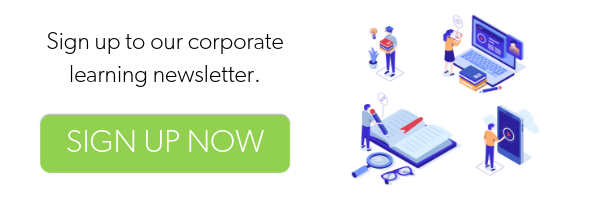Learning Trend 2: Personalization & Adaptive Learning


One of the components that contributes to a learning experience is another major learning trend bounding ahead in 2019: Personalization and adaptive learning.
This trend continues to grow in importance, stemming from a combination of factors, such as the working environment: being short on time to learn and overwhelmed by a deluge of content, employees look to optimise their time looking only for what they need, when they need it, tailored for their specific needs.
About a year ago we were seeing early and simpler applications of personalization, now it’s more of a step-change. According to insight from many of the key analysts and feedback from our own client-facing people, personalization is becoming more of a mainstream expectation than a bonus feature.
“Personalization is becoming more of a mainstream expectation than a bonus feature.”
Donald Taylor’s Global Sentiment Survey 2019 places Personalization at Number 1 on the list of ‘what’s hot’ in eLearning. As Taylor points out, this may be the last year that personalization tops the list, but not necessarily because it is in decline but because it is now becoming more of a ‘business as usual’ feature.[1]
Some examples of personalization that we are seeing and doing for our clients:
- Recommended learning paths by department or role.
- Pre-diagnostic assessments that determine your recommended path or allow you to opt-out of topics.
- Recommendations based on others with a similar professional profile.
- Adaptive learning that adapts to the level of difficulty the learner is ready for.
DATA ANALYTICS AND ARTIFICIAL INTELLIGENCE: ENABLING PERSONALIZATION

Personalization and adaptive learning go hand in hand with data analytics and AI. Data feeds the level of personalization offered, and together with AI can be used to power increasingly sophisticated levels of personalization. As we gather more data both at the big data level and at the individual level, using it intelligently can help refine what we deliver in terms of knowledge and learning, and how we deliver it, both at the wider organizational level and at the individual level.
Data gathered can also be used to provide personalized learning support. It can help point up who needs help and where – this approach is probably used more widely in higher education but is also relevant to corporate learning – pinpointing specific knowledge gaps and needs to focus on for learners who are struggling. This information can then be used to adapt learning approaches to individual needs and to provide personalised services such as targeted mentoring and coaching.
COACHING AND MENTORING: A PERSONALIZED EXPERIENCE
Mentoring and coaching are great ways to provide a richly personalized learning experience that connects employees with an expert in a subject and supports their development. Changing demographics of the workforce point towards new opportunities for both mentoring and coaching – millennials value mentoring and coaching input to support personal and professional development in a supported work environment.
While coaching and mentoring are sometimes differentiated from each other, they have a good deal of overlap. Traditionally speaking, coaching is a form of development where the coach helps the learner achieve a specific goal or skillset through non-directive guidance within a defined scope and time scale, while mentoring is more typically a longer-term relationship to help support growth and career path development of the mentee. Both coaching and mentoring offer both employee and organization significant benefits, including better engagement, which can in turn result in better retention, and improved performance.
Particularly in this time of talent shortages, skills gaps and a growing culture of continuous learning, a carefully designed coaching or mentoring intervention can offer a real opportunity to harness the benefits of one-to-one support that is truly tailored to the needs and goals of the individual.
There are many ways that technology can support mentoring and coaching as a personalized learning experience: expert-led webinars connecting learners with experts in a field, discussion forums where learners can discuss questions with experts or other learners, or live support through for instance 24/7 chat tools.
Bringing AI into the mix, one path to mentoring is to provide chat tools that can be ‘staffed’ by intelligent assistants or bots that can help answer queries and provide expert insight.
 WHERE TO NEXT FOR PERSONALIZATION & ADAPTIVE LEARNING?
WHERE TO NEXT FOR PERSONALIZATION & ADAPTIVE LEARNING?
- Personalization is here and now, a must-have element of the learning experience. It’s a feature of learning where we’re much more in ‘dive in’ than ‘toe in the water’ territory, where there’s an expectation from organizations and end users of a personalized experience, ranging from content recommendations and learning paths tailored around roles and profiles to content adapted to the needs and level of the individual.
- Developing and nurturing a coaching culture within an organization is a direction that seems to be gaining popularity more recently. Typically this involves thinking through coaching, mentoring and employee development in a holistic and systemic way. Current thinking suggests that a coaching culture must infuse all levels of an organization from top to bottom and become an integral part of organizational strategy.2
CURATION
- Content curation forms part of the personalization package that delivers relevant content to individuals’ specific learning needs exactly when they need it. In a broader sense however, content curation is the process that protects people from the deluge of information that threatens to overwhelm at every moment from both inside and outside our organizations: the tidal wave of tweets, blog posts, social media updates, new article notifications, links and recommendations that invade our screens daily.
- Curation performs two distinct functions: it is the protective membrane that holds back the glut of irrelevant material threatening us, while at the same time it is the vital channel that enables our access to useful knowledge, correct information and expert people. Curation in both senses, offers a crucial toolset in the fast-changing, continuous learning-based workplace of the 21st century.
- Many organizations, while not necessarily having nominated individuals as curators within their workplace, distribute the curation function across the organization, using a well thought-through model, with a clear process and standards across organizational content creation. In this way, everyone can be a curator of content. Organizations recognize the importance of curation tools and are bringing them, along with a range of other non-traditional tools including LXPs into their cultures in order to support workplace learning.
 WHAT TO DO NEXT?
WHAT TO DO NEXT?
- Personalization is a must-have. If you’re not already doing it, start now.
- Data is your friend. Use it to personalize learning pathways and the content experience.
- Make coaching and mentoring opportunities available to your employees and foster a
coaching culture.
We believe future learning will become more learner and experience centred. Personalization will become key as organizations tailor learning to the individual through diagnostic assessments, learning paths, recommendations and curated content and learning that constantly adapts to the current and future needs of the learner. Personalization will play a vital role in helping our people and organizations stay competitive.
If you would like more detail on Personalization and Adaptive learning as it increasingly enables and shapes corporate learning and would like to discuss what it means for your organization, why not chat with one of our consultants? Drop us a line to info@intuition.com.




